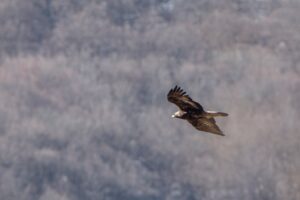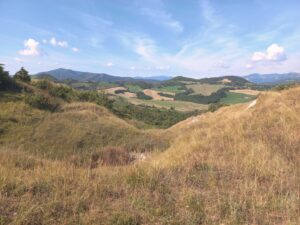Birding the Apennines
Stretching north to south over hundreds of miles, the Apennine Mountains are the geologic spine of the Italian peninsula. This majestic range of limestone and sandstone peaks, reaching an elevation of nearly 10,000 feet, is marked by caves, deep canyons, some of Europe’s oldest forests, and a wide diversity of alpine grasslands. The mountains are inhabited by gray wolf, Apennine chamois, and red deer—and an astonishing avifauna that includes such sought-after species as rock bunting, rock partridge, wryneck, red-billed and alpine choughs, crag martin, white-throated dipper, Bonelli’s warbler, and alpine accentor. Meadows and pastures are home to nightjar, woodlark, northern wheatear, and the rare rufous-tailed rock thrush. Black, middle spotted, and even white-backed woodpeckers can be found deep in mature forests, while the skies above are dominated by such fascinating birds as griffon vulture, lanner falcon, honey buzzard, and short-toed and golden eagles.
reaching an elevation of nearly 10,000 feet, is marked by caves, deep canyons, some of Europe’s oldest forests, and a wide diversity of alpine grasslands. The mountains are inhabited by gray wolf, Apennine chamois, and red deer—and an astonishing avifauna that includes such sought-after species as rock bunting, rock partridge, wryneck, red-billed and alpine choughs, crag martin, white-throated dipper, Bonelli’s warbler, and alpine accentor. Meadows and pastures are home to nightjar, woodlark, northern wheatear, and the rare rufous-tailed rock thrush. Black, middle spotted, and even white-backed woodpeckers can be found deep in mature forests, while the skies above are dominated by such fascinating birds as griffon vulture, lanner falcon, honey buzzard, and short-toed and golden eagles.
One of the special pleasures of birding the Apennines is the region’s special mix of culture and nature. Small villages where people still lead a traditional mountain lifestyle are the perfect places for a rest or a delicious, leisurely meal made with local products.
Protected natural areas in the Apennines include no fewer than eleven national parks: Appennino Tosco-Emiliano, Foreste Casentinesi, Monti Sibillini,
The Northern Apennines are easily reached from major cities such as Florence, Pisa, Lucca, Bologna and Perugia.
“Marco led my two friends and I on a full day tour in the Apennine Mountains. It was the best day — he is very knowledgeable about the birds, trees and flowers. He gave us a great deal of good information both having to do with the nature and the birds in the area and also historical information. I definitely highly recommend Marco” – Happy Customer from TripAdvisor
